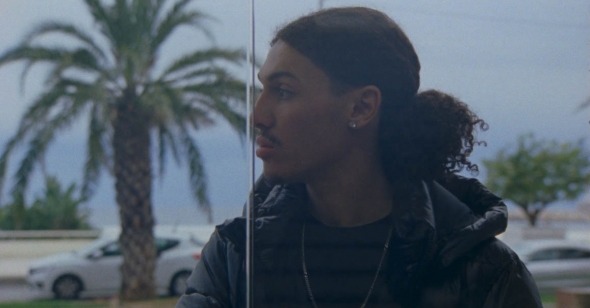Forever Breathes the Lonely Word
By Vikram Murthi
100,000,000,000,000 (aka Cent Mille Milliards)
Dir. Virgil Vernier, France, no distributor
Everything exists within a state of limbo in Virgil Vernier’s 100,000,000,000,000 (aka Cent Mille Milliards). When Afine (Zakaria Bouti), the film’s 18-year-old escort protagonist, finds himself stuck in Monaco during the Christmas season after his fellow sex-worker roommates decamp to Dubai for the holidays, he’s confronted by his own aimlessness. “Nice ass, nice mouth, nice cock, but lacks initiative,” states a voiceover of unknown origin—could it be a review of his services or possibly a self-assessment? This frankly describes how the young man has so far been coasting on good looks and laidback charm without building much of an interior life, let alone a future. Even when Afine moves through a crowd or spends time with a client, he looks slightly lost and isolated.
Afine’s idle state neatly reflects Vernier’s vision of Monaco, a tax haven for the ultra-rich located on the French Rivera, as the vacant epitome of globalized opulence. Shot on 16mm, Cent captures the sovereign city’s gauzy beauty, an outwardly gorgeous tourist destination with unnerving menace that only rampant, obscene wealth can bring. Vernier and cinematographer Jordane Chouzenoux depict Monaco as an eerily empty locale, literally because of the holidays but psychologically as well. Images and sounds of construction recur almost as a portent of infinite expansion, a slow spiritual death by endless growth. “If things carry on like this,” warns a middle-aged female client of Afine’s in the middle of a lush department store, “everything will fall apart.”
Money becomes the nexus of Afine’s makeshift family over the holidays. His Serbian immigrant friend Vesna (Mina Gajovic) invites him to stay with her as she babysits Julia (Victoire Kong), a troubled preteen whose parents are real estate moguls with major investments in Monaco. Julia bonds with Afine, whom she treats like an older brother, because she senses he’s similarly adrift in a world that has made little space for them both. For Afine, it’s because he has few prospects beyond the day-to-day travails of escorting and has never had the ambition to acquire other skills. But for Julia, it’s because her parents’ wealth has afforded her access to doomy information about the future. She’s haunted by what she knows: something disastrous is coming down the pike and only certain people are gonna make it out alive.
A vague pre-apocalyptic tension courses through Chouzenoux’s docu-style footage of Monaco at night, where sparkling lights only serve to highlight the area’s desolation, as well as the film’s cavernous yet claustrophobic domestic interiors, which feel like they’re on the verge of swallowing inhabitants whole. Julia lends credence to this hazy, calamitous feeling by telling Afine secrets, like she’s playing an informant reporting from a short lifetime spent undercover. “They stayed up all night talking in Julia's room,” Julia’s voiceover intones over shots of the city skyline. “She told him about palaces, castles, diamonds, and all the gold she had seen. She told him time didn’t exist. She told him about what happened after death. Afine listened without saying a word, dazzled by all these things he had never heard of before.” The film’s fluid use of voiceover, which frequently switches speakers and rarely identifies its source—whether that’s a phone call, a letter, narration—contributes to a general otherworldly tone, like they’re somehow speaking from beyond the grave while still walking amongst the living.
People like Afine and Vesna are tourists in the land of the rich, laborers and associates dependent upon others’ generosity to make rent or fulfill their dreams. Vesna hopes to open a healing center where she can practice “energy therapy,” a dubious practice involving rituals and special stones. (While Vesna seems to be sincerely invested in the practice, it also promises to be lucrative by catering to the woo-woo whims of the leisure class.) She clearly has affection for Julia, having babysat for her when she was a young child, but she sees her relationship with their family as a means to an end.
What Afine receives from his clients beyond financial restitution remains unclear. Vernier never assumes a judgmental attitude toward sex workers. In fact, Cent luxuriates in the humdrum process of it all (the standing around while clients shop, making awkward conversation before physical contact) rather than its titillating aspects, and Vernier clearly empathizes with Afine and his colleagues’ self-sufficient, enterprising outlooks. But because Afine hasn’t yet constructed a strong sense of self—emphasized by Bouti’s frequently blank melancholic expression, broken up by an occasional smirk, and his apathetic body language—his time spent trading in intimacy has mostly left him bereft of affection and community. He stands in contrast to his hustling peers, one of whom berates him for spending his days doing nothing and subsisting without a long-term plan. Living in the present can often just be a way to relinquish a future.
Afine’s youthful ennui explains the connection he feels with Julia, who at least knows what’s coming, however cataclysmic. Unlike Afine and Vesna, Julia was born into a world of abundance, and she identifies its hollowness but not a means of escape. It would explain why she set fire to her boarding school, a destructive act of rebellion that could be easily interpreted as a failed wake-up call, or why she feels alive traipsing through Monaco’s underground tunnels, a brief peek into the mysterious world beneath a gaudy surface. At film’s end, Julia heads to a private island and promises to send word to Afine so he can join her; alienated from his labor and surroundings, Afine continues to languish alone, desperately waiting for instructions that will likely never arrive. Vernier ends his film with an ominous shot of what might be Julia’s family’s secluded compound, a secure and isolated complex disconnected from a larger society headed for collapse, suggesting that Julia may be safe from harm, but only because she’s in Hell.
